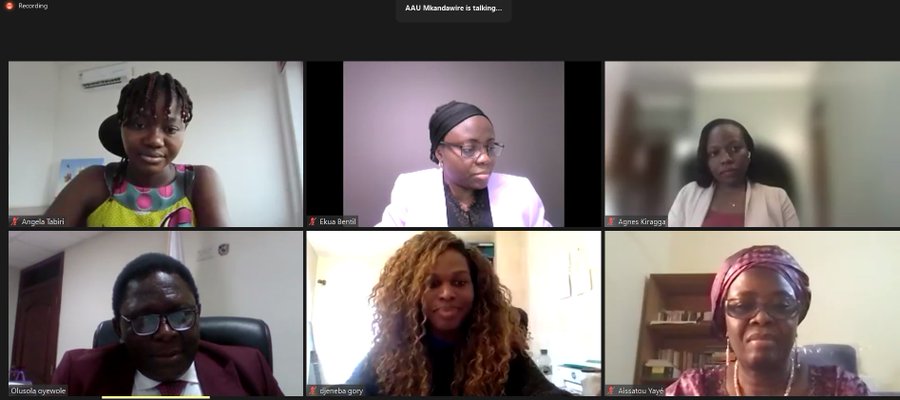Notwithstanding their many successes and significant progress in the professional sphere, women in Sub-Saharan Africa remain underrepresented in both strategic and essential sectors across board, including in higher education. For instance, only 2.5% of vice-chancellors are women and 5% of CEOs are women. However, women make up 43% of those who receive tertiary education but hold 28% of formal sector jobs. While there are several initiatives such as scholarship opportunities for women and increased awareness for the need for gender diversity in leadership roles, aimed at increasing and training the number of women in the leadership pipeline, there is substantial gender imbalance particularly at executive and management levels within higher education. A 2019 Education Sub- Sahara Africa (ESSA) study reported that only 24% of academic staff in tertiary education across Sub-Saharan Africa are female. Institutional efforts to increase the representation of women in academia are improving, but there needs to be greater efforts to avail management and leadership roles in higher education to women.
As part of initiatives to recognize and celebrate the contributions of women in the African higher education space, the Africa Higher Education Centers of Excellence for Development Impact (ACE Impact) Project (under the auspices of the World Bank and the Association of African Universities) organized a webinar on Tuesday March 29, 2022. Themed “Inspiring Women as Leaders of African Higher Education”. The webinar sought to encourage young women in academia, particularly students, to actively take up leadership roles in the African higher education sector as well as make efforts towards systemic change through different ways such as entrepreneurship and initiatives to empower women. Over 150 students and stakeholders from across the continent participated in this event. Also, in attendance were, the Secretary-General of the AAU, Prof. Olusola Bandele Oyewole, the ACE Impact Project Manager, Dr. Sylvia Mkandawire, World Bank Senior Education Specialist and Task Team Leader for the ACE Impact Project, Dr. Ekua Bentil and World Bank Education and Gender Specialist for ACE Impact Project, Djénéba Gory.
In his welcome remarks, Prof. Oyewole commended the ACE Impact Project for being instrumental in addressing gender disparity through initiatives such as encouraging female enrolment in the Centres of Excellence. He reiterated the AAU’s commitment to driving the agenda of female empowerment and ensuring that women can contribute equally as key actors in the African higher education space. Dr. Bentil noted on her part that the World Bank considers the gender agenda as a top priority as it seeks to champion the development of the African continent through inclusivity and called on stakeholders to be gender conscious especially as regards leadership positions.
Panel discussions were held on various areas relating to driving gender inclusivity in African Higher Education. The Panel members, seasoned women in STEM, Agribusiness, and Entrepreneurship, shared their experiences and challenges as women in their respective fields. They included Dr. Agnes Kiragga, a Research Scientist and technical lead for data science at the African Population Health Research Council (Kenya); Dr. Angela Tabiri, a Research Associate, and an Academic Manager for the Girls in Mathematical Sciences Program (GSMP) at the African Institute for Mathematical Sciences (AIMS), Ghana; and Mrs. Zeinabou Hamani, a Coordinator at Agrifocus (Niger), a food security expert and an Agripreneur advocate. The session was moderated by Professor Aissetou Drame Yayé, the Deputy Centre Director for the Regional Centre of Excellence for Pastoral Production: Meat, Milk, Hide and Skin (CERPP), Niger.
Speaking on the relevance of STEM to global development, Dr. Kiragga explained that Data Science and Artificial Intelligence (AI) are key solutions to various developmental challenges globally, providing statistics crucial for policy formation in all sectors of the economy, as well as improving productivity and work efficiency. Dr. Tabiri highlighted the importance of Applied Mathematics in everyday life, noting that in Agriculture especially, it can help predict rainfall patterns among other things. She also mentioned the need for mentorship for young girls especially at the basic level. She said, “There are few inspirations for young girls at the basic level of education as compared to their male counterparts especially in STEM. Therefore, it is crucial to strengthen the campaign to increase women in STEM right from the basic level.” Ms. Hamani also emphasized the critical role of Data Science and AI in Agricultural production chains.
The panelists mentioned structural and institutional barriers, societal expectations, gender stereotypes, and the patriarchal nature of many African academic institutions as some of the challenges that inhibit women’s rise to leadership positions in higher education. The lack of female role models and mentors to guide young talented women through their academic careers further worsens the gender disparity.
To address these challenges, the panelists acknowledged the need for stakeholder engagement to understand these barriers and, proffer and implement practical solutions. Furthermore, restructuring of institutional policies to accommodate measures to catalyze women’s progress in African higher education is key to bridging the gender divide. Finally, mentorship programmes driven by female higher education role models would serve as a springboard for bringing more women on board in the sector.
In the Q&A session, participants expressed their appreciation for the experiences shared by the panelists and noted they were encouraged to follow their dreams and build themselves up to be leaders and authorities in their respective fields. The Africa Centres of Excellence for Development Impact (ACE Impact) project intends to follow up with a series of events focused on inspiring and empowering young women in higher education within the region.
